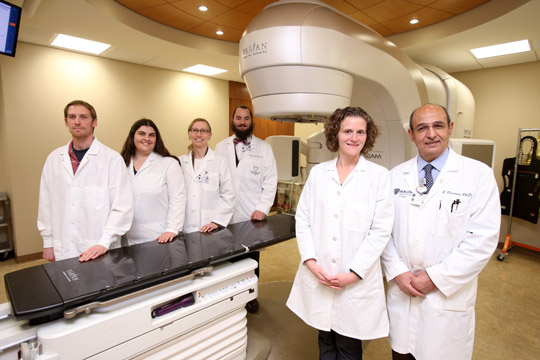Radiation and chemotherapy treatments can have negative impacts on normal functions in the body and become so severe that some patients choose to discontinue their treatment plans.
Dr. Heather Conti, UT assistant professor of biological sciences, recently was awarded $60,000 from Ohio Cancer Research to support a study titled “Proinflammatory Cytokines IL-23 and IL-17 in Radiotherapy Induced Oral Mucositis” to explore what mechanisms cause one of the most common debilitating complications of cancer treatment called oral mucositis.

Conducting research to better understand oral mucositis with Dr. E. Ishmael Parsai, right, and Dr. Heather Conti are, from left, Nathan Schmidt, research assistant in the Department of Biological Sciences; Jackie Kratch, graduate student in the Department of Biological Sciences; Lisa Root, director and attending vet in the Department of Lab Animal Resources; and Dr. Nicholas Sperling, assistant professor of medical physics. They are standing by the Varian Edge System at UT’s Eleanor N. Dana Cancer Center.
“Patients receiving chemotherapy or radiation of the head and neck can develop severe damage to the lining of the oral cavity,” Conti said. “The inflammation and sores can make it difficult and painful for the patient to speak, eat or drink, and can lead to an increased risk of serious infection.”
She has joined forces with Dr. E. Ishmael Parsai, radiation oncology professor and chief of the Medical Physics Division, to take a cross-disciplinary approach in examining oral mucositis in mouse models.
“I am thrilled to be working alongside Dr. Parsai. He has amazing, cutting-edge radiology equipment that he uses to treat patients, and it is one of the leading reasons why I chose to come to UT to conduct my research,” Conti said. “He will provide radiation treatments to the mouse models that are very similar to what cancer patients receive. We can then examine how interleukins, IL-23 and IL-17 are involved in cell-to-cell communication and are involved in the development of oral mucositis.”
These proteins are proinflammatory cytokines produced by both humans and mice.
Candida albicans is a yeast fungus that naturally occurs within the mouth, gut and vaginal tract, but given the chance to flourish in a patient where damage to the mucosal tissue has occurred due to radiation treatments, it can take hold and cause inflammation. It is the most common secondary infection in cancer patients.
Parsai said that despite advances in radiation treatment that have made it highly precise, such as the Varian Edge System used at UT’s Eleanor N. Dana Cancer Center, healthy tissue still can be affected.
“I am looking forward to working with Dr. Conti to better understand how oral mucositis develops,” he said. “This research could lead to the development of better drugs to treat it and its associated infections, so that patients are able to successfully complete their course of cancer treatments.”